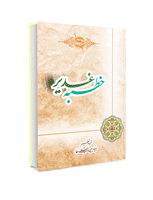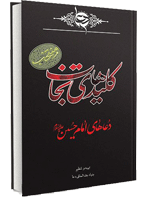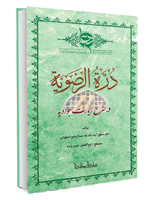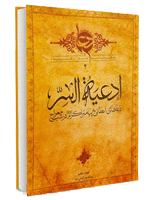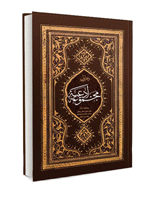- Prophet Muhammad (P.B.U.H&HF): Whenever one of you is needy and brings that to other people, he will not be satisfied. and Whenever someone is needy and brings that to Lord, he shall give him what he wants. sooner or later.
- Imam Sadiq (As.): Whenever you had tenderness in your heart, Pray. because your heart doesn't get tender unless it's pure.
- I told to Imam Baqir (A.S): “What is the meaning of “truly, Ibrahim was awwah and patient”? He replied: “Awwah means (the one who is) praying (to) and wailing (for God) a lot.””
- “Two people, who have acted alike, enter the heaven, but one of them sees the other one in a higher place. Then, he says: O’ Lord! How come has he a superior place in comparison to me while we acted alike? God the Almighty replies: “because he asked Me (whatever he needed) and you did not do that”.
- “The most knowledgeable person to God is the one who asks more from Him”
- “Whoever prays a lot, the angels say: This voice is familiar (to us) and this is the supplication which is accepted and this is the need which is provided”
-
The Holy Prophet (peace be upon him and his Household):
-
وَ لَوْ عَرَفْتُمُ اللَّهَ حَقَّ مَعْرِفَتِهِ لَزَالَتِ الْجِبَالُ بِدُعَائِكُم
If you knew god the way you should’ve known, Mountains definitely will be moved by your supplications. - Crying out of fear of God is the key to his mercy, it’s a sign for his acceptance and it’s a door to answering [supplications]
- Pray to God and believe in his answeres. But understand that God won't accept prays from an unwitting oblivious heart.
Study of Quranic virtues in the supplication of Abu-Hamzah Thumali
بسم الله الرّحمن الرّحیم
Study of Quranic virtues in the supplication of Abu-Hamzah Thumali
Author: Maryam Jalali Nizhad
A university academic staff member, Babak city
Translator: AbdolQhadir Mojahid Ghaznavi
Summary
Intertextuality is a translation of the French term introduced in 20th century linguistics by Julia Kristeva. Intertextuality. Intertextuality is a type of approach to the text that gives a new meaning to it. Sahifa Radhaviyah is a compilation of Imam Redha supplications which in addition to perfect eloquence, include the highest concepts and divine knowledge. As far as Imam Redha (PBUH) is the Talking Qur’an, the Infallible Imam, and of the most acquainted figures with the secret knowledge of Silent Qur’an (The Written Book), it is obvious that He has well used from the concepts and meanings of the Qur’an and Has expressed them in a perfectly delightful and literal eloquent articulations, in such a way that it exceeds the words of creature and inferior to the words of the Creator. Intertextuality between the Qur’an and Sahifa Radhaviyah is of external type of intertextuality, and generally, this impact is divided into two parts: 1. The impact of the Qur’anic phrases and vocabulary. 2. The impact of Qur’anic concepts. Using the Qur’anic verses and concepts are concretely obvious in the Sahifa Radhaviyah. The Sahifa Radhaviyah intertextuality with Qur’an has noticeably taken place with the minimum alteration in words and concepts. The Qur’anic impact on Imam Redha’s supplications has given them an irrefutable unique and exceptional exquisiteness.
This essay, based on descriptive analytical method, focuses on the Qur’anic intertextuality in Sahifah Radhaviyah, as well as the presence of Qur’anic concepts, meanings and verses in and at the same time, to reveal the impact and influence of the illuminating Qur’anic verses on it in order to analyse the influence of the absent text (Holy Qur’an) on the present text (Sahifah Radhaviyah).
Keywords: Intertextuality, Imam Redha (PBUH), Sahifah Radhaviyah.
Intertextuality
Intertextuality is one of the trends of new criticism that deals with the relationship and interaction between texts. This theory was proposed by Julia Kristeva in the late sixties.
Sahifah Radhaviyah
It is the compilation of Imam Redha’s supplications in which in addition to perfect eloquence and fluency, include sublime meanings and utmost divine knowledge.
According to my idea, most of the forms of intertextual relations in supplications of Sahifah Radhaviyah have been made openly and in the forms of partial, general and parallel negations. And this, on the one hand, has added to the beauty and the impact of this work, and on the other hand, its accurate understanding requires knowledge of the Scared Book, the Holy Qur'an.
In this paper, first, we become acquainted with intertextuality and its types, and secondly, based on the descriptive and analytical method, we concentrate on the intertextuality between the Qur’an and the supplications of Sahifah Radhaviyah.
Intertextuality
Intertextuality in the simplest definition is the relation between two words, and in a profounder sense, it is the interrelation of two literary texts.
Intertextuality as a new critical method which deals with the interaction between texts.
The term intertextuality was first used by Julia Kristeva in an article in 1966 in Tel Quel magazine and then in her book Semiotics in 1969. She believes that texts always intersect with each other and each text can be considered a pavement formed by the accumulation of various stones. So, in a way, each text is realized by changing another text and its influence in itself. (Kristeva, 1984, p. 60).
Kristeva's definition of intertextuality, that every text is derived and transformed from many other texts, introduced the two terms of “present text” and “absent text” into intertextual discussions. The existing text is called the present text and the texts that have interacted with the current text are called the absent texts. It means that every text is the consequence of adaptation process from other texts. The hidden/absent text explains the present text and by which the reader can understand the present text. (Al-Musa, 2000 AD, page 51).
Types of intertextualities
Many types are counted for intertextuality which the followings are the most important ones:
1. Internal adaptation (allusion). It means that the writer uses of his previous works in his new text. This type of intertextuality takes place among one generation and one period when there is a resemblance between the cultural and social life of the authors.
External adaptation (allusion). This is type occurs when the writer adapts and uses from what others have written.
Dr. Alyafi has also divided the intertextuality into two types of explicit and implicit:
1.Explicit intertextuality. A text that uses external and direct quotations and themes while having an independent reference.
2.Implicit or hidden intertextuality. A text which has been adapted from other different texts and alterations have been applied to it in a way that the reader would not be able to differentiate.
(Alyafi, 1997AD, page 81)
The triple rules govern the relations between the present and absent texts.
These rules are as follows:
1.Partial negation/denial. In this type of intertextuality relationship, the author quotes a part of the absent text in his present text. And the present text is a continuation of the absent text and has the least renovation. (Ezam, 2005 AD. p. 116)
1.Parallel negation/denial. This type, which is more sophisticated than the previous one, the hidden text is fully acknowledged and is quoted in the present text in such a way that substantially has not gone through alteration. (Khalil, 2000 AD. p. 55)
1.General negation/denial. This type holding the highest intertextual relation, needs deliberate and precise analysis to brilliantly comprehend the hidden text, , due to the fact that in this form of relation, the hidden text has encountered a over-all alteration in a way that is used for a contrasting meaning to the hidden or absent text.
3.The Qur’anic intertextuality in the supplications of Sahifah Radhaviyah.
oThe influence of Quranic vocabulary
Words are the primary building blocks through which every writer presents his mental images.
Verbal intertextuality is utilizing the words or vocabulary from the absent text which appear in the present text through semantic and contextual implication.
1.The present text:
وَ وَعَدْتَ الْقَانِطِينَ مِنْ رَحْمَتِكَ بِقَوْلِكَ: "يا عِبادِيَ الَّذِينَ أَسْرَفُوا عَلى أَنْفُسِهِمْ لا تَقْنَطُوا مِنْ رَحْمَةِ اللَّهِ إِنَّ اللَّهَ يَغْفِرُ الذُّنُوبَ جَمِيعاً إِنَّهُ هُوَ الْغَفُورُ الرَّحِيمُ" وَ حَذَّرْتَ الْقَانِطِينَ مِنْ رَحْمَتِكَ فَقُلْتَ: "وَ مَنْ يَقْنَطُ مِنْ رَحْمَةِ رَبِّهِ إِلَّا الضَّالُّون".
(And You have promised those who are desperate from Your mercy by Your statement: “My servants who have acted extravagantly against themselves still do not despair of God's mercy. God forgives all offences; He is the Forgiving, the Merciful.” And You have warned those who are desperate from Your mercy, thus You said: “And who despairs of the mercy of his Lord, excepting those that are astray?”
The absent text:
قُلۡ يَٰعِبَادِيَ ٱلَّذِينَ أَسۡرَفُواْ عَلَىٰٓ أَنفُسِهِمۡ لَا تَقۡنَطُواْ مِن رَّحۡمَةِ ٱللَّهِۚ إِنَّ ٱللَّهَ يَغۡفِرُ ٱلذُّنُوبَ جَمِيعًاۚ إِنَّهُۥ هُوَ ٱلۡغَفُورُ ٱلرَّحِيمُ
Say: “My servants who have acted extravagantly against themselves still do not despair of God's mercy. God forgives all offences; He is the Forgiving, the Merciful.” (Surah Zumar, verse 53)
قَالَ وَمَن يَقۡنَطُ مِن رَّحۡمَةِ رَبِّهِۦٓ إِلَّا ٱلضَّآلُّونَ
He said: “And who despairs of the mercy of his Lord, excepting those that are astray?” (Surah Hijr, verse 56)
In the 21st supplication of Sahifah Radhaviyah, Imam Redha (PBUH) has adorned with the enlightening verse of Qur’an. Imam Redha (PBUH) in this part of His supplication, uses these luminous verses of the Qur'an to ask God to void and eliminate hardships and problems, which in terms of wording and meaning are proportional and harmonious with what He wants to express.
In this part, while addressing the Almighty God, His Holiness draws the attention of the desperate people to the Mercy of God, while at the same warns from being despair of the Mercy of God.
The intertextuality used is of the external type and very obvious.
2.The present text:
ٱدۡعُونِيٓ أَسۡتَجِبۡ لَكُمۡۚ إِنَّ ٱلَّذِينَ يَسۡتَكۡبِرُونَ عَنۡ عِبَادَتِي سَيَدۡخُلُونَ جَهَنَّمَ دَاخِرِينَ
“Pray unto Me and I will hear your prayer. Lo! those who scorn My service, they will enter hell, disgraced.”
وَقَالَ رَبُّكُمُ ٱدۡعُونِيٓ أَسۡتَجِبۡ لَكُمۡۚ إِنَّ ٱلَّذِينَ يَسۡتَكۡبِرُونَ عَنۡ عِبَادَتِي سَيَدۡخُلُونَ جَهَنَّمَ دَاخِرِينَ
And your Lord hath said: “Pray unto Me and I will hear your prayer. Lo! those who scorn My service, they will enter hell, disgraced.” (Surah Ghafir, verse 60)
Imam Redha (PBUH) in this part also uses the Holy verse of the Qur'an to ask God to void and eliminate hardships and problems. He has used or quoted this verse without any alteration and the intertextuality utilized in it is obvious and of the partial negation type.
3.The present text:
يَوۡمَ نَدۡعُواْ كُلَّ أُنَاسِۭ بِإِمَٰمِهِمۡۖ
“On the day when We call every nation with their leader/Imam”
The absent text:
يَوۡمَ نَدۡعُواْ كُلَّ أُنَاسِۭ بِإِمَٰمِهِمۡۖ
On the day when We call every nation with their leader/Imam (Surah Esra, verse 71)
This verse emphasizes that the division of people in the Day of Judgment will be based on their leaders and everyone must inevitably choose a role model and leader for himself. Therefore, Imamate and Wilayah (Guardianship) are of the very core of life, not a mere marginal subject of belief.
The proposed intertextuality is obvious and apparent (direct quotation).
4.The present text:
فَسَآءَ صَبَاحُ ٱلۡمُنذَرِينَ
“Evil shall then be the morning of the warned ones.”
The absent text:
فَإِذَا نَزَلَ بِسَاحَتِهِمۡ فَسَآءَ صَبَاحُ ٱلۡمُنذَرِينَ
“But when it shall descend in their court, evil shall then be the morning of the forewarned ones.”
This verse describes the conditions of the polytheists which hasten for the descendance of divine punishment, and when the punishment descends upon them, despite being forewarned, what a miserable morning they encounter with. Imam Redha (PBUH) has perfectly conveyed His intended concept at the end of the supplication recited in the Qunut (a especial way of holding hands to supplicate) of prayers which is for voiding the evils of the foes.
The proposed intertextuality is obvious and apparent (direct quotation).
5.The present text:
قَالَتۡ إِنِّيٓ أَعُوذُ بِٱلرَّحۡمَٰنِ مِنكَ إِن كُنتَ تَقِيّٗا
She said: “Indeed, I seek refuge in the Beneficent One from you, if you are God- fearing.”
The absent text:
قَالَتۡ إِنِّيٓ أَعُوذُ بِٱلرَّحۡمَٰنِ مِنكَ إِن كُنتَ تَقِيّٗا
She said: “Indeed, I seek refuge in the Beneficent One from you, if you are God- fearing.” (Surah Maryam, verse 18)
In this verse, the Holy Maryam (PBUH) seeks refuge to the Mercyful, (Al-Rahman), due to her fear of the manifestation of the Gabreil in the form of a mature man, and She argues based on the virtue. She meant that I’m a virtuous girl, and every virtuous person does not commit any sin, therefore, if you are also a virtuous person, the same reinforcement should stop you from assaulting and attempting to do anything wrong to me.
The type of intertextuality here of the obvious and parallel negation.
6.The present text:
إِنَّ مَعَ ٱلۡعُسۡرِ يُسۡرًا * إِنَّ مَعَ ٱلۡعُسۡرِ يُسۡرٗا
“Surely with difficulty is ease” * “Surely with difficulty is ease”
The absent text:
فَإِنَّ مَعَ ٱلۡعُسۡرِ يُسۡرًا * إِنَّ مَعَ ٱلۡعُسۡرِ يُسۡرٗا
“So surely along with difficulty is ease” * “Surely along with difficulty is ease”
(Surah Sharh, verses 5, 6)
By omitting one letter, Imam Redha (PBUH) has benefited from this holy verse, and has mentioned it in the supplication which is recited as an amulet for domestic quadrupeds. The intertextuality here is obvious.
•The impact of Qur’anic concepts:
In the previous examples, the presence of the absent text in the present text were based on the words, but in the following examples of intertextuality, the write or the stator, inspired by the Qur’anic verses and after grasping their concepts (of course this is for other than the Infallible Imams (PBUT), as they are the personal manifestation of the Qur’an, or better say, they are the talking Qur’an), conveys their concept and context by his own words, or in other word, he paraphrases, in a way that the reader does not find any clear word or direct quotation of the absent text.
1.The present text:
يَا رَبِّ لَمَّا سَمِعْتُكَ تُنَادِي الْمُسْرِفِينَ إِلَى بَابِك
“O my Lord, as far as I have heard that You have called the profligates to Your gate…”
The absent text:
قُلۡ يَٰعِبَادِيَ ٱلَّذِينَ أَسۡرَفُواْ عَلَىٰٓ أَنفُسِهِمۡ لَا تَقۡنَطُواْ مِن رَّحۡمَةِ ٱللَّهِۚ إِنَّ ٱللَّهَ يَغۡفِرُ ٱلذُّنُوبَ جَمِيعًاۚ إِنَّهُۥ هُوَ ٱلۡغَفُورُ ٱلرَّحِيمُ
Say: “My servants who have acted extravagantly against themselves still do not despair of God's mercy. God forgives all offences; He is the Forgiving, the Merciful.” (Surah Zumar, verse 53)
The intertextuality used in this phrase of His supplication is obvious and apparent and the terms such as (extravagant, You call, the gate) are perfectly adapted. The relation is of the general negation type. And this verse is the most hopeful for the wrongdoers, that if they repent, all their mistakes and sins will be forgiven.
2.The present text:
اللَّهُمَّ آمَنْتُ بِمُحَمَّدٍ وَ لَمْ أَرَهُ فَلَا تَحْرِمْنِي يَوْمَ الْقِيَامَةِ رُؤْيَتَهُ ارْزُقْنِي صُحْبَتَهُ وَ تَوَفَّنِي عَلَى مِلَّتِهِ وَ اسْقِنِي مِنْ حَوْضِهِ مَشْرَباً رَوِيّاً سَائِغاً هَنِيئاً- لَا ظَمَأَ بَعْدَهُ أَبَدا
“O God, I believe in Mohammad although I have not seen Him, thus, do not deprive me of meeting Him in the Judgement Day, Grant me His companionship, and cause me to die following His religion, and give me to drink from His cistern a sweet, pleasant drink - after which there will never be any thirst.” (Sahifah Radhaviyah)
The absent text:
وَإِذۡ قَالَ إِبۡرَٰهِـۧمُ رَبِّ ٱجۡعَلۡ هَٰذَا بَلَدًا ءَامِنٗا وَٱرۡزُقۡ أَهۡلَهُۥ مِنَ ٱلثَّمَرَٰتِ
“And when Abraham said, "My Lord, make this a land secure, and provide its people with fruits…” (Surah Baqarah, verse 126).
لَا يُصِيبُهُمۡ ظَمَأٞ وَلَا نَصَبٞ وَلَا مَخۡمَصَةٞ فِي سَبِيلِ ٱللَّهِ
“No thirst would afflict them, nor any stress nor starvation along God's way…”
The relation between the two are of general negation and it is of obvious type.
3.The present text:
وَ مَنَحْتَهُ بِالْإِجَابَةِ وَ الشَّفَاعَة
“And You bestowed upon Him (the Prophet, peace be upon Him and His Household) with the answer and intercession.”
The absent text:
وَلَسَوۡفَ يُعۡطِيكَ رَبُّكَ فَتَرۡضَىٰٓ
“And surely soon your Creator and Nurturer Will grant you so much of the Blessings That you will be joyous from it.” (Surah Dhuha, verse 5)
In the supplication which Imam Redha (PBUH) indicates the Prophet as her intercessor, has used from the illuminous verse of the Qur’an. The most hopeful verse for the Prophet (PBUH&HF) is the aforementioned verse of Surah Dhuha, which depicts the sublime status of intercession given to the Him.
The intertextual relation between the two texts is of the general negation which is the highest level of intertextuality.
4.The present text:
وَ صَلَّى اللَّهُ عَلى مُحَمَّدٍ وَ أَهْلِ بَيْتِهِ الْأَخْيَارِ الَّذِينَ أَذْهَبَ اللَّهُ عَنْهُمُ الرِّجْسَ وَ طَهَّرَهُمْ تَطْهِيراً
“And may God’s blessings be upon Mohammad and His Chosen Household, from whom God removed impurity and purified them with a thorough purification.”
The absent text:
إِنَّمَا يُرِيدُ ٱللَّهُ لِيُذۡهِبَ عَنكُمُ ٱلرِّجۡسَ أَهۡلَ ٱلۡبَيۡتِ وَيُطَهِّرَكُمۡ تَطۡهِيرٗا
“Indeed, Allah wills to repel/eliminate all impurity from you, O People of the Household, and purify you with a thorough purification.” (Surah Ahzab, verse 33)
Imam Redha (PBUH) has used Quranic themes and has composed His supplication. A slight glimpse at the present text, evokes the Qur’anic verse in the reader’s mind. The relation between the two texts is of general negation or paraphrasing.
(Translator: The terms and concepts of intertextuality used in these texts may not be equivalent to the ones used in Western literary texts, although they might be the first people coining the terms in their own languages, but in the Islamic terms, there are different terms for intertextuality, which one has to find out in the comparative studies done by the well-known Shiite scholars.)
Conclusion
By the investigations carried out in the supplications of Sahifah Radhaviyah, we understand that there is a very close and undeniable connection between the text of the Holy Qur'an and the supplications of Imam Redha (PBUH), and this has increased the eloquence of these supplications. Imam Redha (PBUH) is an Orator/talking Qur'an, while the scripted Qur’an is the silent Qur’an, therefore, it is apparent that he uses concepts, themes, and verses from the Qur'an in His words, in a way that his words ascend above the words of the created and below the words of the Creator. Therefore, the intertextual relations between the Sahifah Radhaviyah and the Holy Qur'an are of the external intertextual type, and the use of Quranic verses and themes in the Sahifah Radhaviyah can be seen concretely.
Intertextual relationships in these supplications, on the one hand, add to their eloquence, fluency and impact, and on the other hand, their accurate understanding requires familiarity with Quranic concepts and themes, and vice versa.
(Translator: The Infallibles’ supplications and statements/hadiths are in fact the lower level of Qur’anic themes and concepts, or better say the exact commentary and explanations of Qur’anic knowledge.)
The source for the verses is the Holy Qur’an and for the supplication is Al-Sahifah Al-Radhaviyah Al-Jami’a, complied by Mohammad Baqir Mowahid Abtahi.

ˈmembər
member


